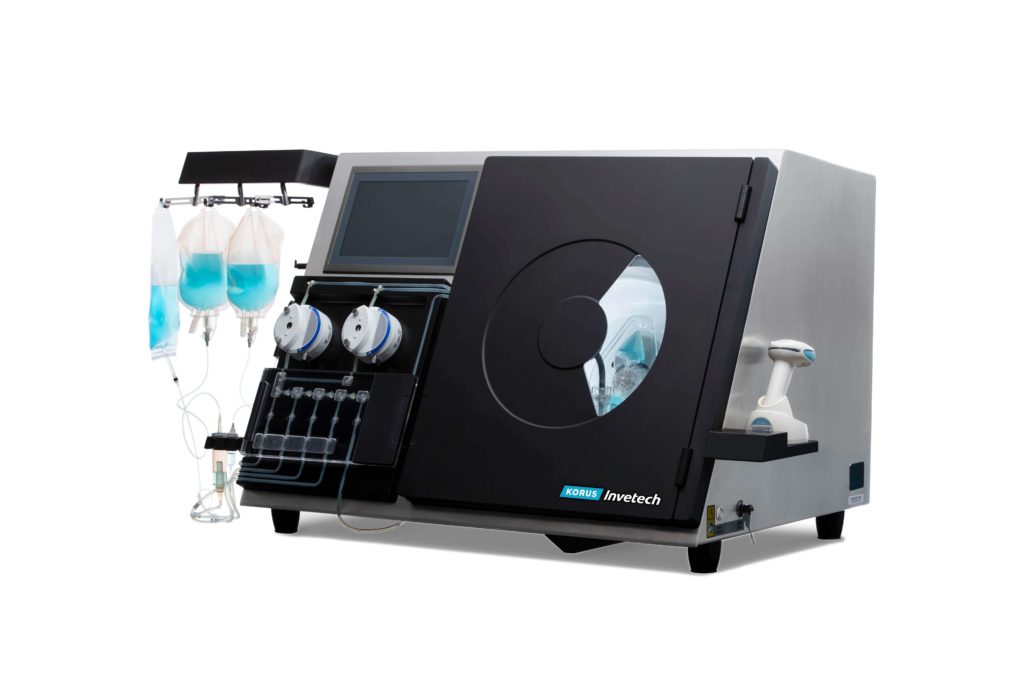SAN DIEGO, California, USA, 21st June 2022 — Invetech launches Korus™, a closed system for autologous cell therapies that features elutriation and cell wash using gentle counterflow centrifugation. Korus has the potential to transform cell therapy industry standards, with supporting data demonstrating improved manufacturing performance compared to samples prepared by standard washing. The system delivers purified cell populations for downstream processing development and commercial manufacturing, resulting in better overall process performance through higher recovery and purity of target cells.
Innovation in cell processing is much needed to improve process development and GMP manufacturing performance and ensure a high enough yield for a viable therapy. Developers can now speed up clinical development, efficiently scale-out and be poised to be first to market with Invetech’s new Korus system.
“To fast-track the commercialization of cell and gene therapies, our industry needs efficient and scalable manufacturing technologies that can deliver high quality therapies cost-effectively,” says Andreas Knaack, Invetech’s President. “Invetech’s new technology offering, as demonstrated by our new Korus™ system, represents our continued commitment to helping make life-saving therapies accessible to more patients.”
Invetech’s Korus system uses a gentle elutriation process to provide a cleaner cell population for cell therapy production. Study results show a transformative change to processing starting materials compared to current industry standards that will set manufacturers up for downstream success.
Compared to standard washing protocols, the Korus can result [i] in:
- 31% purer lymphocyte population
- 49% improvement in T cell recovery after selection
- 70% more T cells during expansion
- 2.5X improvement in manufacturing yield
Integrating Korus technology into a cell therapy manufacturing process can lead to better downstream performance including significantly higher target cell recovery during selection and significantly higher cell growth during expansion. The 2.5X improvement in manufacturing yield means that cell therapy developers can expect to more consistently grow enough cells for a viable final cell therapy product.
During testing in the above internal study, similar lymphocyte recovery performance was seen in both Korus™ and CS5+ (wash) control arms despite the increase in purity in the Korus arm due to elutriation. Relative Korus T cell selection recovery and fold expansion were considerably higher leading to over 70% more cells cultured in the Korus arm.
Jon Ellis, who leads Invetech’s Cell Therapy Science & Application team explains the results of Korus’s testing program. “Manufacturing efficiency of cell therapies needs improvement and innovation if the cell therapy industry is going to reach its commercialization goals. Our data shows that whilst achieving similar apheresis lymphocyte cell recovery to the control wash process, Korus eluted lymphocytes to high purity which resulted in improvements in downstream performance including greater Dynabead cell selection recovery and fold expansion.”
“Overall, this innovation in cell processing will reduce the impact of starting material variability, contribute to higher manufacturing yield and reduced risk of batch failure; and potentially reduce the cost of goods for future therapies.”
The Korus system is for research, laboratory or further manufacturing use only. It is not intended as a medical device in therapeutic or diagnostic procedures. Customers are responsible for validating the use of Korus within their process or therapy.
Related links: Korus product page
The full comparison study can be accessed here.
About Invetech
Invetech helps cell and gene therapy developers to visualize, strategize and manage the future. Through ready-to-run systems, custom solutions and full-spectrum services, we swiftly accelerate vital, emerging therapies from the clinic to commercial-scale manufacturing. Together with our partners, we expand the reach of next-generation medical advances that are revolutionizing healthcare.
